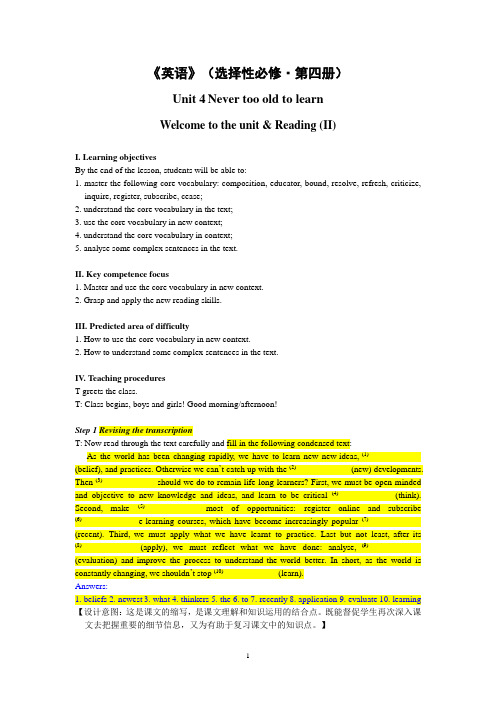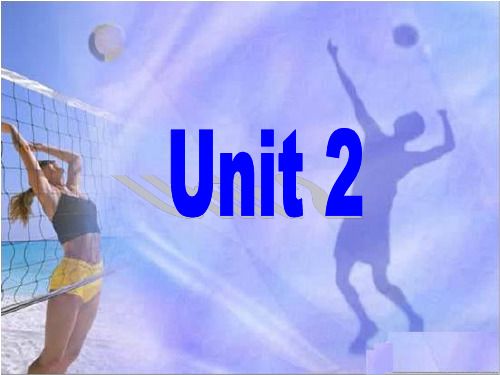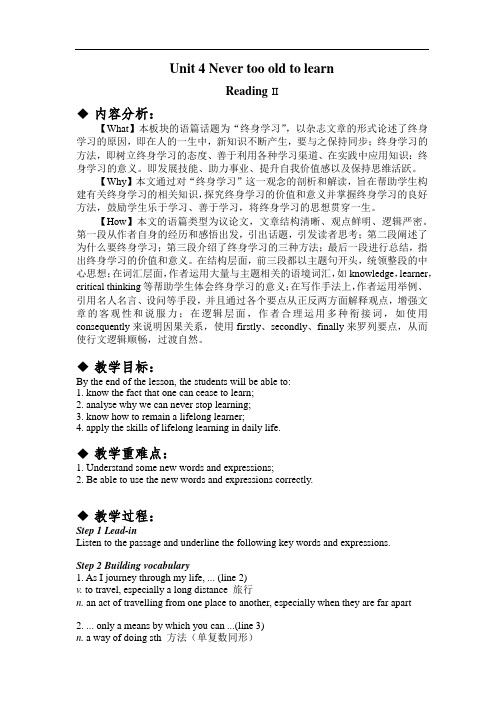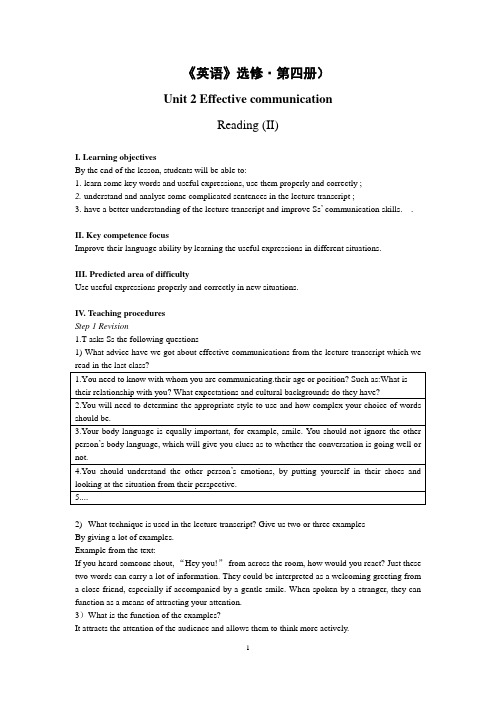译林版高中英语必修四教案(江苏省专用):Unit4《Reading2》
译林英语必修四Unit2Reading PPT课堂课件(39页)

both were / are held every 4 years some of the sports played are still played now
Detailed reading
Task III (Read paras5-8)
Muhammad Ali
He wishes the Olympic Movement a successful future to match its past glory.
Reading for structures
Get the main idea of each part
Main ideas
Part 1: the topic of the speech
(Para.1)
Part 2: the history of the Olympics
(Para. 2-4)
Part 3: some famous sports stars and (Para. 5-8) their great contributions
Part 4: the closure of the speech
achievements
1992 Barcelona Olympics;
1996 Atlanta Olympics
four gold medals, table tennis
the greatest female table tennis player the world has ever seen
C1
2
3
4
B
1 23
4
D1
3
4
2
译林英语必修四Unit2Reading PPT课堂课件(39页)-精品PPT课件
译林版高中英语选必四Unit4 Reading II 教案

《英语》(选择性必修·第四册)Unit 4Never too old to learnWelcome to the unit & Reading (II)I. Learning objectivesBy the end of the lesson, students will be able to:1. master the following core vocabulary: composition, educator, bound, resolve, refresh, criticize,inquire, register, subscribe, cease;2. understand the core vocabulary in the text;3. use the core vocabulary in new context;4. understand the core vocabulary in context;5. analyse some complex sentences in the text.II. Key competence focus1. Master and use the core vocabulary in new context.2. Grasp and apply the new reading skills.III. Predicted area of difficulty1. How to use the core vocabulary in new context.2. How to understand some complex sentences in the text.IV. Teaching proceduresT greets the class.T: Class begins, boys and girls! Good morning/afternoon!Step 1 Revising the transcriptionT: Now read through the text carefully and fill in the following condensed text: As the world has been changing rapidly, we have to learn new new ideas, (1)____________ (belief), and practices. Otherwise we can’t catch up with the (2)____________ (new) developments. Then (3)____________ should we do to remain life-long learners? First, we must be open-minded and objective to new knowledge and ideas, and learn to be critical (4)____________ (think). Second, make (5)____________ most of opportunities: register online and subscribe (6)____________ e-learning courses, which have become increasingly popular (7)____________ (recent). Third, we must apply what we have learnt to practice. Last but not least, after its (8)____________ (apply), we must reflect what we have done: analyse,(9)____________ (evaluation) and improve the process to understand the world better. In short, as the world is constantly changing, we shouldn’t stop(10)____________ (learn).Answers:1. beliefs2. newest3. what4. thinkers5. the6. to7. recently8. application9. evaluate 10. learning 【设计意图:这是课文的缩写,是课文理解和知识运用的结合点。
译林英语必修4 Unit2 readingPPT

译林英语必修4 Unit2 reading (共45张PPT)
When and where will the 31st Olympic Games be held?
the city of Rio de Janeiro
the first time a South American or a Portuguesespeaking nation hosts the event
译林英语必修4 Unit2 reading (共45张PPT)
译林英语必修4 Unit2 reading (共45张PPT)
What is its official logo?
译林英语必修4 Unit2 reading (共45张PPT)
译林英语必修4 Unit2 reading (共45张PPT)
How much do you know about the Olympic Games? Now let’s have a quiz to see who knows the most about the Olympic Games.
译林英语必修4 Unit2 reading (共45张PPT)
译林英语必修4 Unit2 reading (共45张PPT)
Wushu
It is a traditional sport in China.
译林英语必修4 Unit2 reading (共45张PPT)
Gymnastics
Gymnastics is a sport involving the performance of exercises requiring physical strength, flexibility, power, agility, coordination, grace and balance.
译林版高中英语选必四Unit4 Reading II 教案(雅礼版)

Unit 4 Never too old to learnReading II◆内容分析:【What】本板块的语篇话题为“终身学习”,以杂志文章的形式论述了终身学习的原因,即在人的一生中,新知识不断产生,要与之保持同步;终身学习的方法,即树立终身学习的态度、善于利用各种学习渠道、在实践中应用知识:终身学习的意义。
即发展技能、助力事业、提升自我价值感以及保持思维活跃。
【Why】本文通过对“终身学习”这一观念的剖析和解读,旨在帮助学生构建有关终身学习的相关知识,探究终身学习的价值和意义并掌握终身学习的良好方法,鼓励学生乐于学习、善于学习,将终身学习的思想贯穿一生。
【How】本文的语篇类型为议论文,文章结构清晰、观点鲜明、逻辑严密。
第一段从作者自身的经历和感悟出发,引出话题,引发读者思考;第二段阐述了为什么要终身学习;第三段介绍了终身学习的三种方法;最后一段进行总结,指出终身学习的价值和意义。
在结构层面,前三段都以主题句开头,统领整段的中心思想;在词汇层面,作者运用大量与主题相关的语境词汇,如knowledge,learner,critical thinking等帮助学生体会终身学习的意义;在写作手法上,作者运用举例、引用名人名言、设问等手段,并且通过各个要点从正反两方面解释观点,增强文章的客观性和说服力;在逻辑层面,作者合理运用多种衔接词,如使用consequently来说明因果关系,使用firstly、secondly、finally来罗列要点,从而使行文逻辑顺畅,过渡自然。
◆教学目标:By the end of the lesson, the students will be able to:1. know the fact that one can cease to learn;2. analyse why we can never stop learning;3. know how to remain a lifelong learner;4. apply the skills of lifelong learning in daily life.◆教学重难点:1. Understand some new words and expressions;2. Be able to use the new words and expressions correctly.◆教学过程:Step 1 Lead-inListen to the passage and underline the following key words and expressions.Step 2 Building vocabulary1. As I journey through my life, ... (line 2)v. to travel, especially a long distance 旅行n. an act of travelling from one place to another, especially when they are far apart2. ... only a means by which you can ...(line 3)n. a way of doing sth 方法(单复数同形)by means of 通过...方法by all means 当然可以by no means 绝不单复数同形常见词:Chinese, Japanese, sheep, deer, works(工厂), series➢Practice makes perfect.Television is _______ effective means of communication.All the means _________________(try) up to now.She is _______ no means an inexperienced teacher.3. ... should not be perceived as a weekness...(line 5)v. to notice sth 注意到...v. to understand sb/sth in a particular way 将...理解为...perceive sb/sth as sthperceive-perception➢Practice makes perfect.She did not perceive ________(she) as disabled.This discovery was perceived _____ a major breakthrough.I perceived _____ change in her behaviour last week.There is a general public __________(perceive) that standards in schools are falling.4. When I drew a still life, ... (line 7)adj. not moving; calm and quiet 静止的;平静的adj. with no wind 无风的➢Practice makes perfect.The kids found ______ hard to keep still.We stayed in a village ________ time has stood still.翻译:Still waters run deep.5. As you progress through life,.... (line 12)v. to improve or develop over a period of time 改进;进展v. to move forward 前进;行进v. to go forward in time (时间上)推移,流逝➢Practice makes perfect.The course allows students ___________(progress) at their own speed.The line of traffic ___________(progress) slowly through the town in rush hours. The weather became colder as the day _________(progress).6. ... be exposed to many new ideas, beliefs...(line 14)常见以f结尾,直接加s变成复数的名词海湾(gulf)悬崖(cliff)屋顶上(roof),首领(chief)奴仆(serf)一起望,谁说他们无信仰(belief),证据(proof)就在手帕上(handkerchief)。
英语:Unit2《Sporting events》reading课件(2)(译林牛津版必修4)

9. Find all the phrases in the text for “全世界” 全世界” 全世界 L14 from around the world L19 from all over the world L48 across the world
10. be recognized as 1. The Great Wall is recognized as one of the Seven Wonders of the World. 2. The invention of computer was recognized as a milestone in the history of man. 3. New York City is recognized as a city of great international influence.
4. No matter who you are, you must obey the rule. 5. No matter where I go, I’ll think of you. 6. You’ll be pleased no matter which you choose. 7. No matter how much money we may have, we should all learn to treasure every dollar. 8. No matter what you do, you should be careful.
1. No matter what difficulty she meets with, she will never give up. 2. No matter how I tried to persuade him, he just didn’t take my words seriously. 3. No matter whether it is rainy or sunny, the football match will be played as planned.
江苏省徐州市王杰中学高一英语课件:Unit2 reading(牛津译林版必修4)

The word for the animal:
ox/ cow
sheep
pi g pork / bacon
The word for the meat:
beef
mutton
Modern English
1. When did modern English begin? Modern English began during the Renaissance in the 16th century. 2. What changes had happened during this period of time? Many Latin and Greek words were added to English and pronunciation also underwent huge changes .
3.Do you think English has always stayed the same? Give some examples to domenstrate your point . 4. How did these changes happen?
skimming
• 1. What is the article about? English and its history. • 2. What are the three kinds of English discussed in the article?
Anglo-Saxon (base of old English) Old English
5th---9th century At the end of 9th By the 10th century
Anglo-Saxon (base) Old English language of Denmark ( official language) language of Norway
译林版高中英语选必四Unit2 Reading II 教案

《英语》选修·第四册)Unit 2 Effective communicationReading (II)I. Learning objectivesBy the end of the lesson, students will be able to:1.learn some key words and useful expressions, use them properly and correctly ;2.understand and analyse some complicated sentences in the lecture transcript ;3.have a better understanding of the lecture transcript and improve Ss’ communication skills. .II. Key competence focusImprove their language ability by learning the useful expressions in different situations.III. Predicted area of difficultyUse useful expressions properly and correctly in new situations.IV. Teaching proceduresStep 1 Revision1.T asks Ss the following questions1) What advice have we got about effective communications from the lecture transcript which we2)What technique is used in the lecture transcript? Give us two or three examplesBy giving a lot of examples.Example from the text:If you heard someone shout, “Hey you!”from across the room, how would you react? Just these two words can carry a lot of information. They could be interpreted as a welcoming greeting from a close friend, especially if accompanied by a gentle smile. When spoken by a stranger, they can function as a means of attracting your attention.3)What is the function of the examples?It attracts the attention of the audience and allows them to think more actively.【设计意图:复习上节课的文本的主要内容。
译林版高中英语必修二Unit 4 Reading (II) 教案

《英语》(必修·第二册)Unit 4 Exploring literatureReading (II)I. L earning objectivesBy the end of the lesson, students will be able to:1. understand the usage of the following words and expressions: appeal (to), determine, significant, description, reflect, capable (be capable of), contain, element,(in) summary;2. use the above words and expressions in new situations;3. understand synonyms and antonyms;4. give examples to support ideas.II. Key competence focus1. Understand some new words and expressions.2. Use the new words and expressions in new situations.III. Predicted area of difficultyUse the new words and expressions correctly.IV. Teaching proceduresStep 1 Lead-inReview the main points of the article.T: Hello, everyone! We’ve learned an article which describes the wonder of literature. We need to understand the significant qualities of literature if we want to enjoy and understand it. What are the qualities of literature? Would you fill in the blanks according to what you have learned?【设计意图:回归课本,回忆文章,为下一步的词汇学习进行铺垫。
